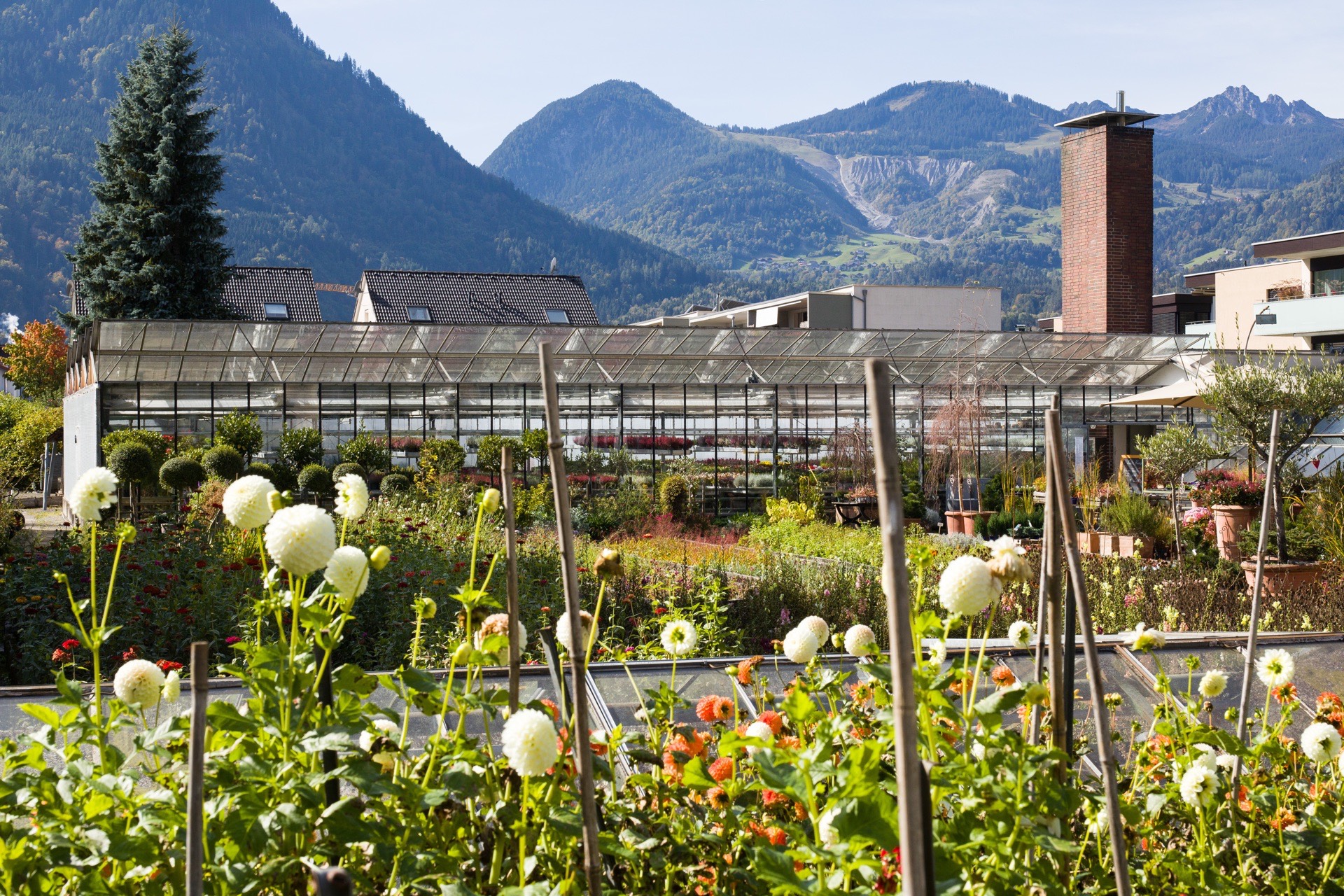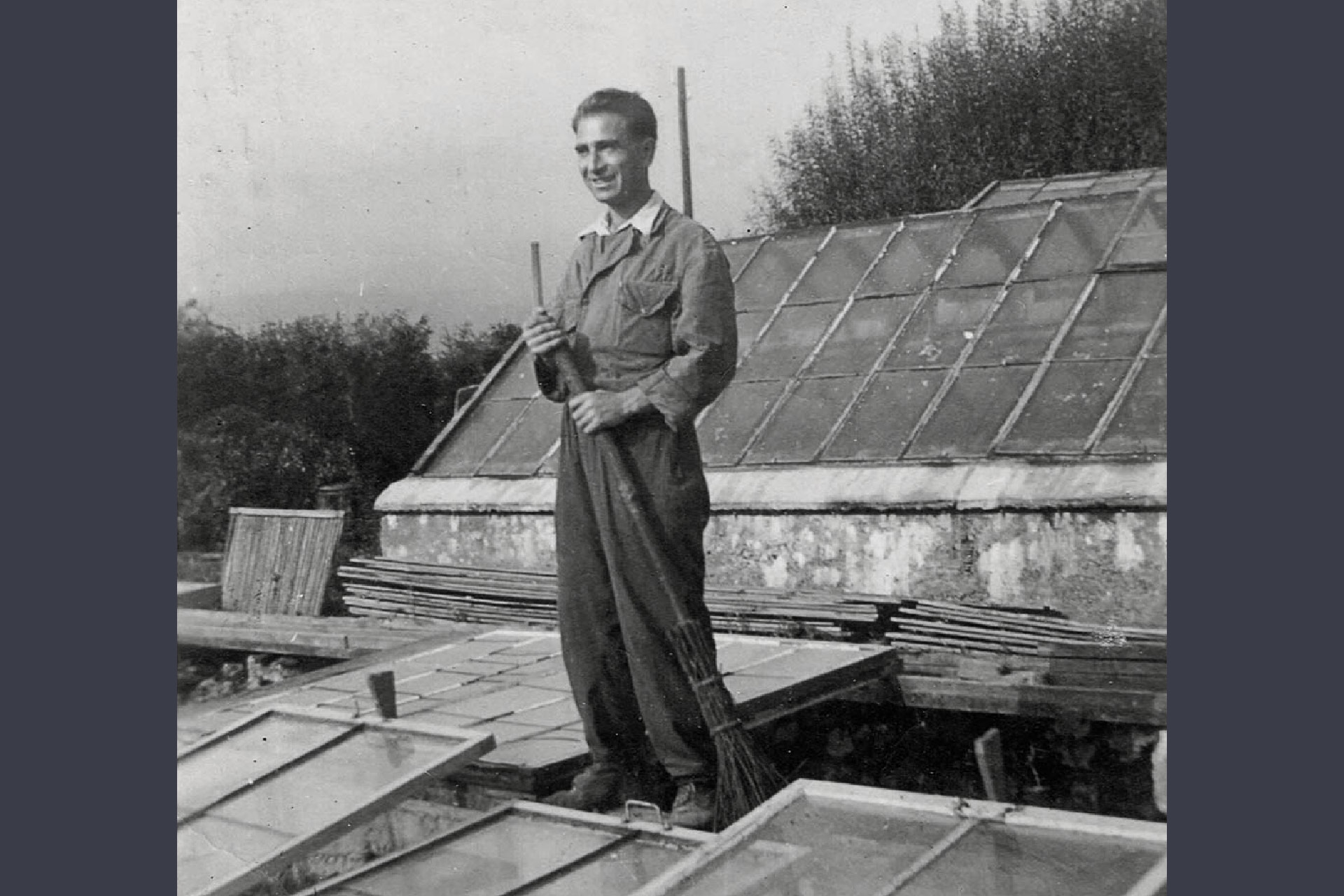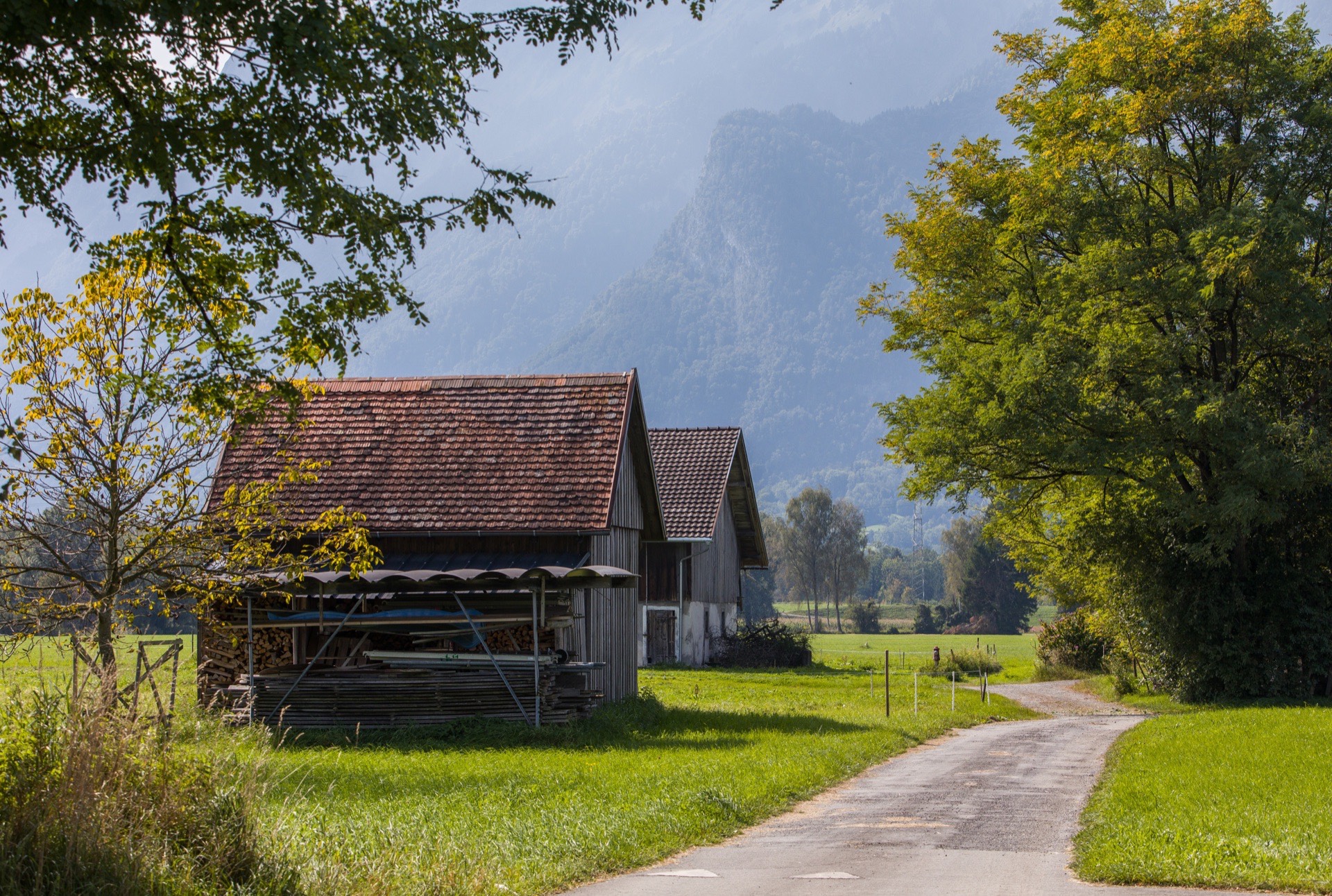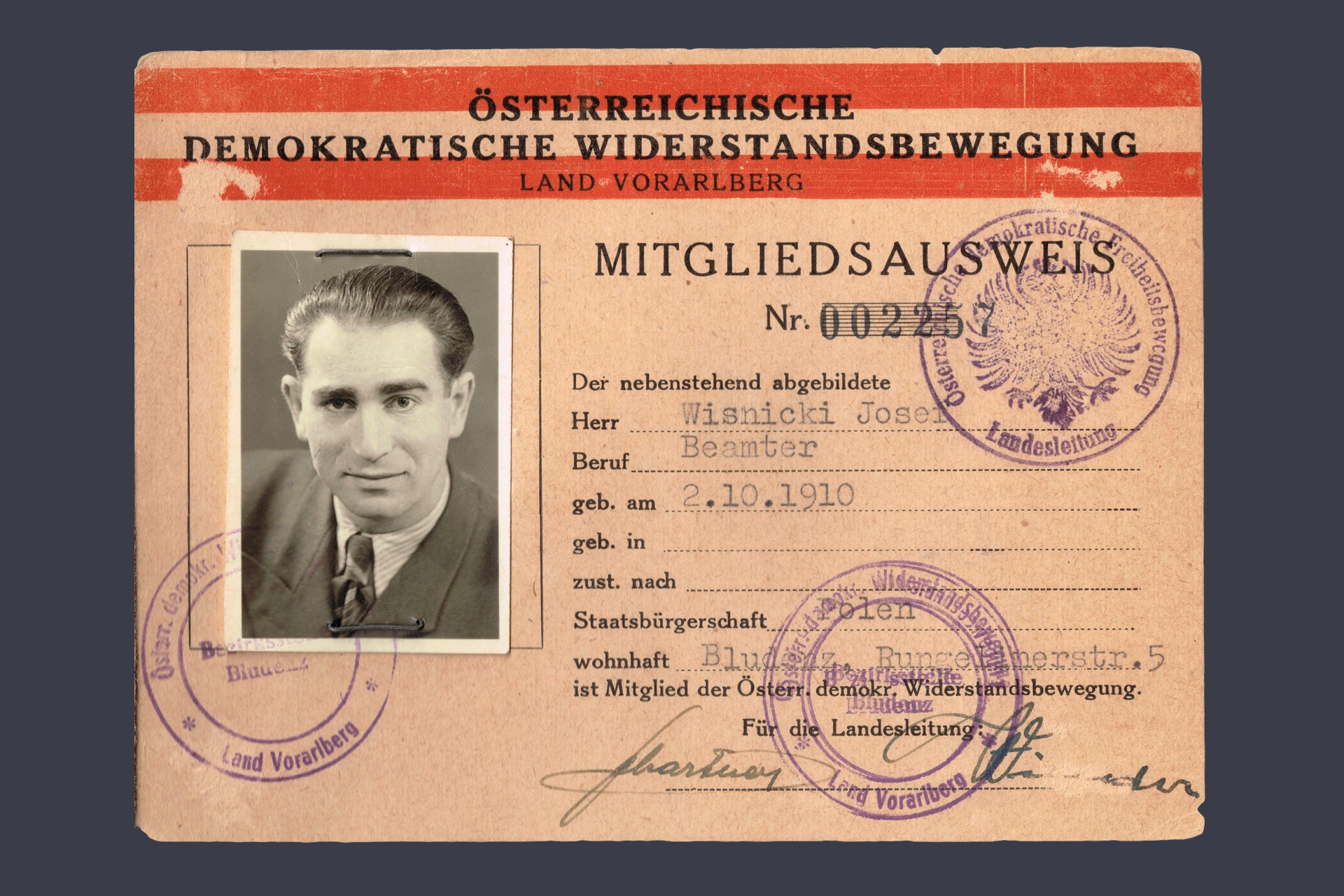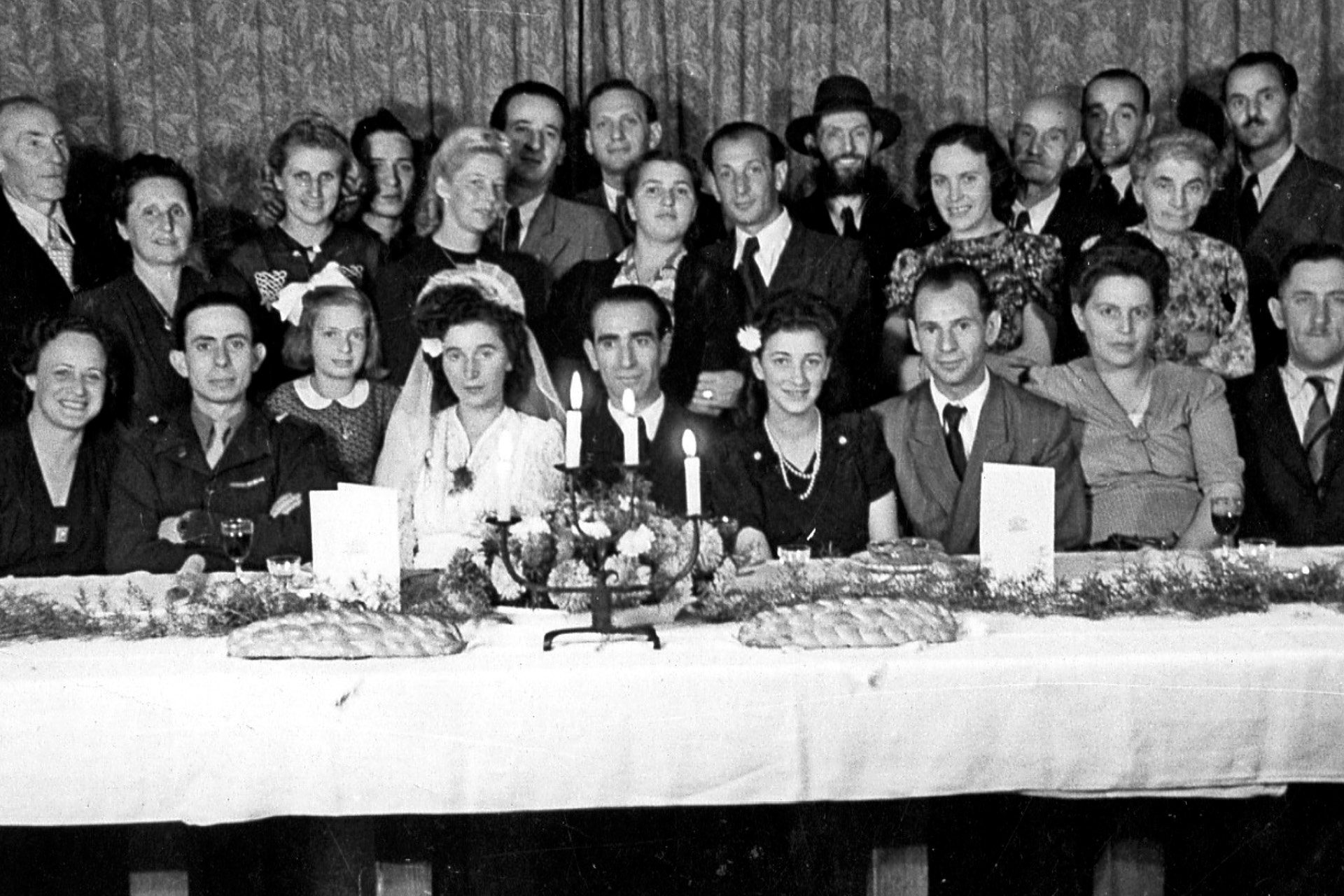Józef Wiśnicki> Summer 1944
45 Józef Wiśnicki
Survived as a “Catholic”: Józef Wiśnicki's escapes
Bludenz – Bangs, summer 1944
Under a false identity, Józef Wiśnicki managed to go into hiding as a Polish foreign worker in Vorarlberg. He found work at the Schaub market garden in Bludenz. Wiśnicki is believed to be a Catholic officer in the Polish army. A young colleague, Elmar Schallert, puts Wiśnicki in touch with the former Christian Social politician Karl Zerlaut. He is looking for a man of confidence among the Polish foreign workers.
Wiśnicki has already saved his life three times through a dramatic escape. In 1944, he tries it a fourth time. Later he recalls this time of uncertainty.
“The Hotel, where I lived, had a restaurant. On Sundays, the busiest day of the week, the sister of the hotel owner used to come in and help wait on customers. I used to get from her a so called ‘Shtamgericht’, a dish of potatoes only, for which one did not need any food stamps. The rest of the week she lived with her mother on their farm, located in the Village of Bangs, near Feldkirch and adjacent to the Rhein river in the middle of which ran the border between Germany and Liechtenstein.”
Wiśnicki is not really familiar with the local geography. But he believes the river offers him a chance to get to freedom.
“Here I hoped to have a chance to realize my goal. In a conversation with her, I offered to come to Bangs on my vacation to help them with their work on the farm. (...) I went to Bangs, via Feldkirch, spent there a week helping out on the farm. From the edge of the farm and the river Rhein, I could see the shore of Liechtenstein, a distance of about 1000 feet" he still believes "and at night I could hear their church bells ringing every hour. Just over this river, I thought, people are free, and here I live in constant fear for my life.”
But Wiśnicki is disappointed.
“A border guard on this side, who was a friend of the family I visited with, told me at a dinner conversation, that he didn’t have to worry if he missed an escapee. Anybody who tries and accomplished the crossing of the river, is being sent back by the Liechtenstein border police. Obviously, I didn’t need to hear anything more.... This shattered my dream and I returned to Bludenz.”
Józef Wiśnicki was born and grew up in Częstochowa. He actually experienced September 1, 1939 as a Polish soldier. And like tens of thousands of other Polish Jews, he fled to the east, to Lemberg, where Soviet troops were moving in, just as Hitler and Stalin had agreed with each other. Less than two years later, in June 1941, Nazi Germany also invades the Soviet Union. Wiśnicki returns to Częstochowa, to his parents in the ghetto to which the Germans have meanwhile driven Częstochowa's Jews.
In September 1942, the first selections also take place in Częstochowa. Wiśnicki believes that as a young man he will be sent to work. But the transport is going to the Treblinka extermination camp. On the way, he observes two fellow prisoners squeezing through the skylights of the cattle car - and follows them. The escape succeeds. He finds himself in a suburb of Warsaw - and returns to Częstochowa.[1]
With the help of a non-Jewish helper, he soon plans his third escape. False papers, make him 6 years older and Roman Catholic. He keeps his name. He manages to make it as far as Bludenz. There no one can recognize or betray him.
Nothing came of his escape to Switzerland. But soon afterwards, in August 1944, he was suspected of being Jewish. He tries to escape again, but this time he is arrested with a gun drawn. And once again he manages to get his head out of the noose. He is circumcised for medical reasons, he explains to the police. In the police prison he learns the Lord's Prayer by heart for safety. For three weeks he was held in Gestapo custody in Innsbruck and interrogated. Finally they believed his story and released him back to Bludenz.
But in January 1945 he was arrested again, without knowing why. Until April he works in Bregenz prison as a food delivery boy, then - the war is almost over – he is transferred to the Reichenau concentration camp in Innsbruck.
Wiśnicki survived the last days of Nazi rule there as well. Once again he returns to Bludenz, now actually becoming responsible for the liberated Polish forced and foreign laborers and joining the “Austrian Democratic Resistance Movement”. Still no one knows that he is Jewish.
But in autumn 1945 he learns that Jewish survivors are gathering in Innsbruck and are being looked after there. He met Leokadia Justman in the “Jewish office” in Innsbruck.
On September 15, 1946, the two were married. It is the first Jewish wedding in Innsbruck after the Holocaust.
[1] Josef Wisnicki, My Fight for Survival. New York 1997, p. 15-16. The story of Józef Wiśnicki was researched by Niko Hofinger.
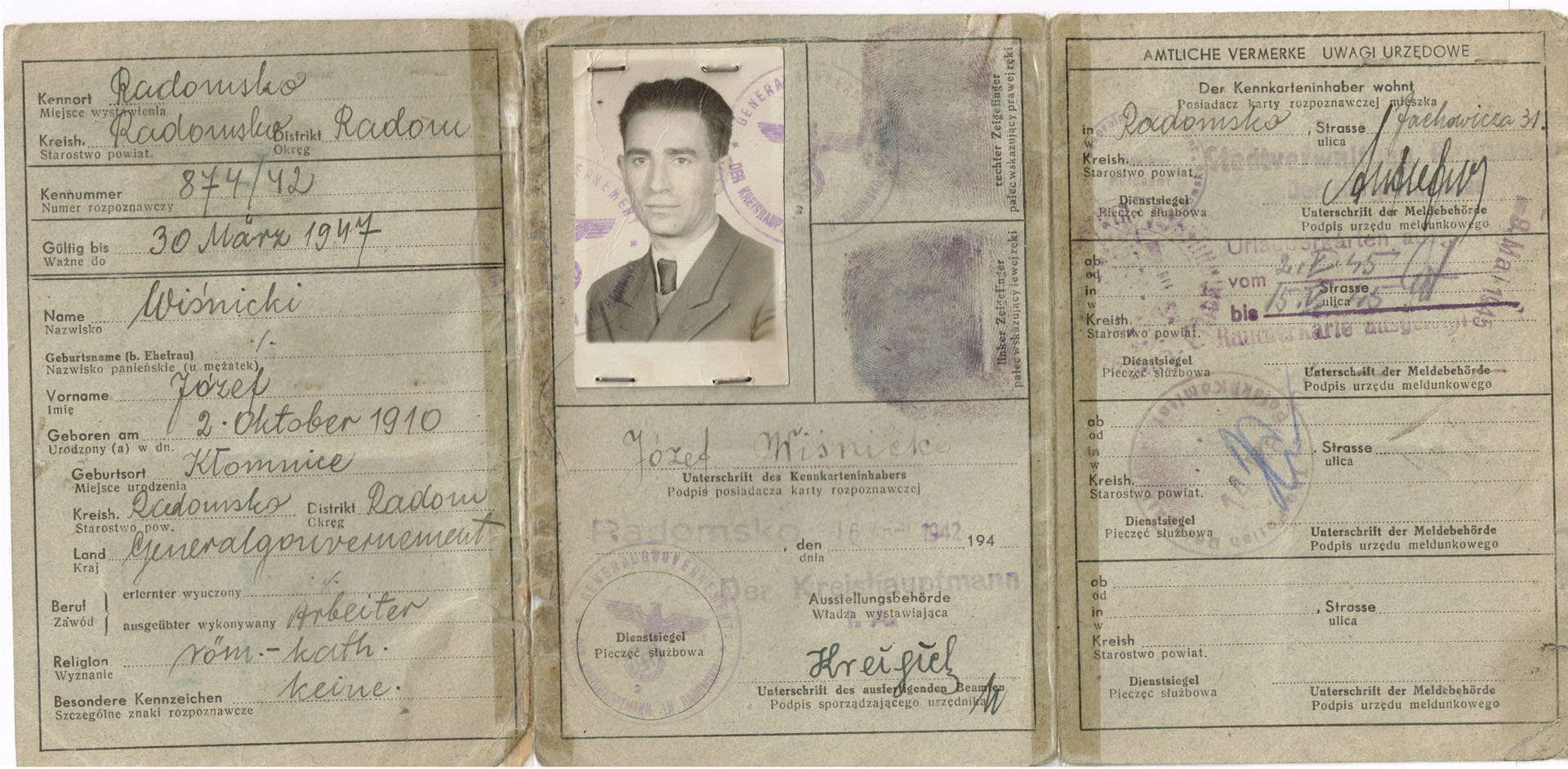
Identity card of Józef Wiśnicki, about 1943
Family Archive Wisnicki, West Palm Beach, Florida, USA
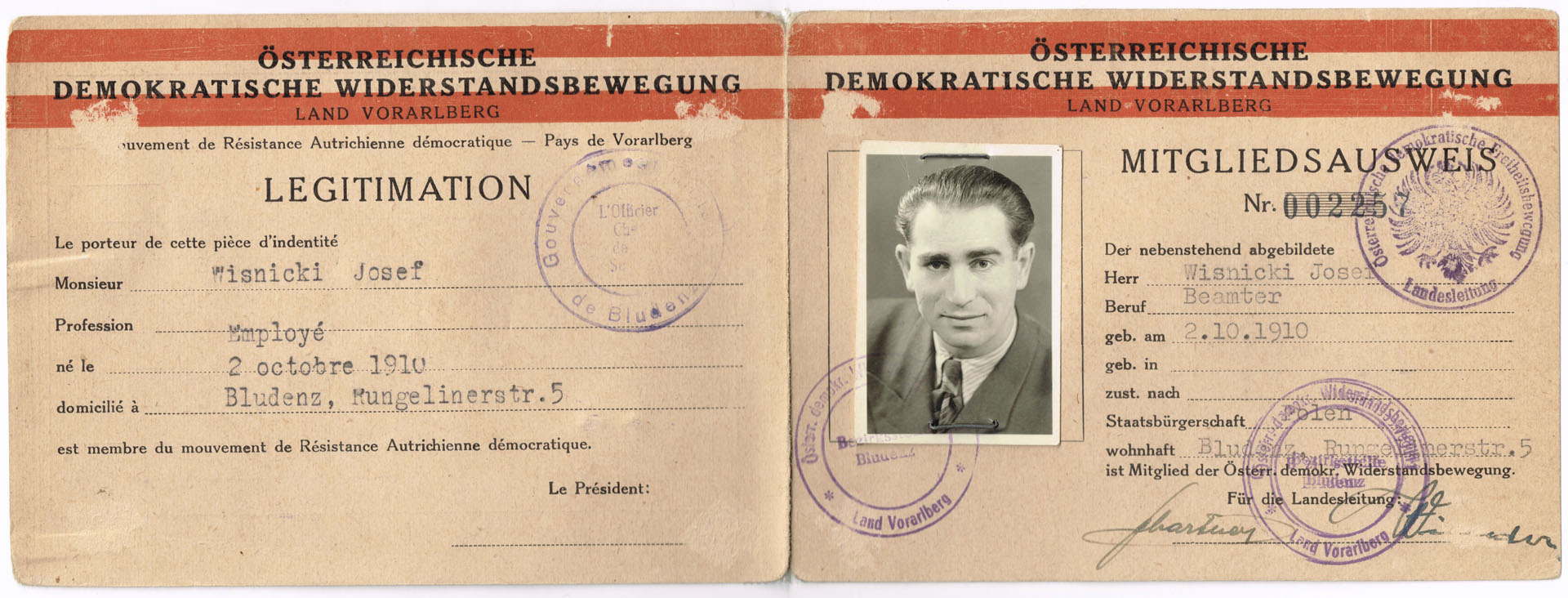
Membership card of Józef Wiśnicki in the Austrian Resistance Movement, 1945
Family Archive Wisnicki, West Palm Beach, Florida, USA
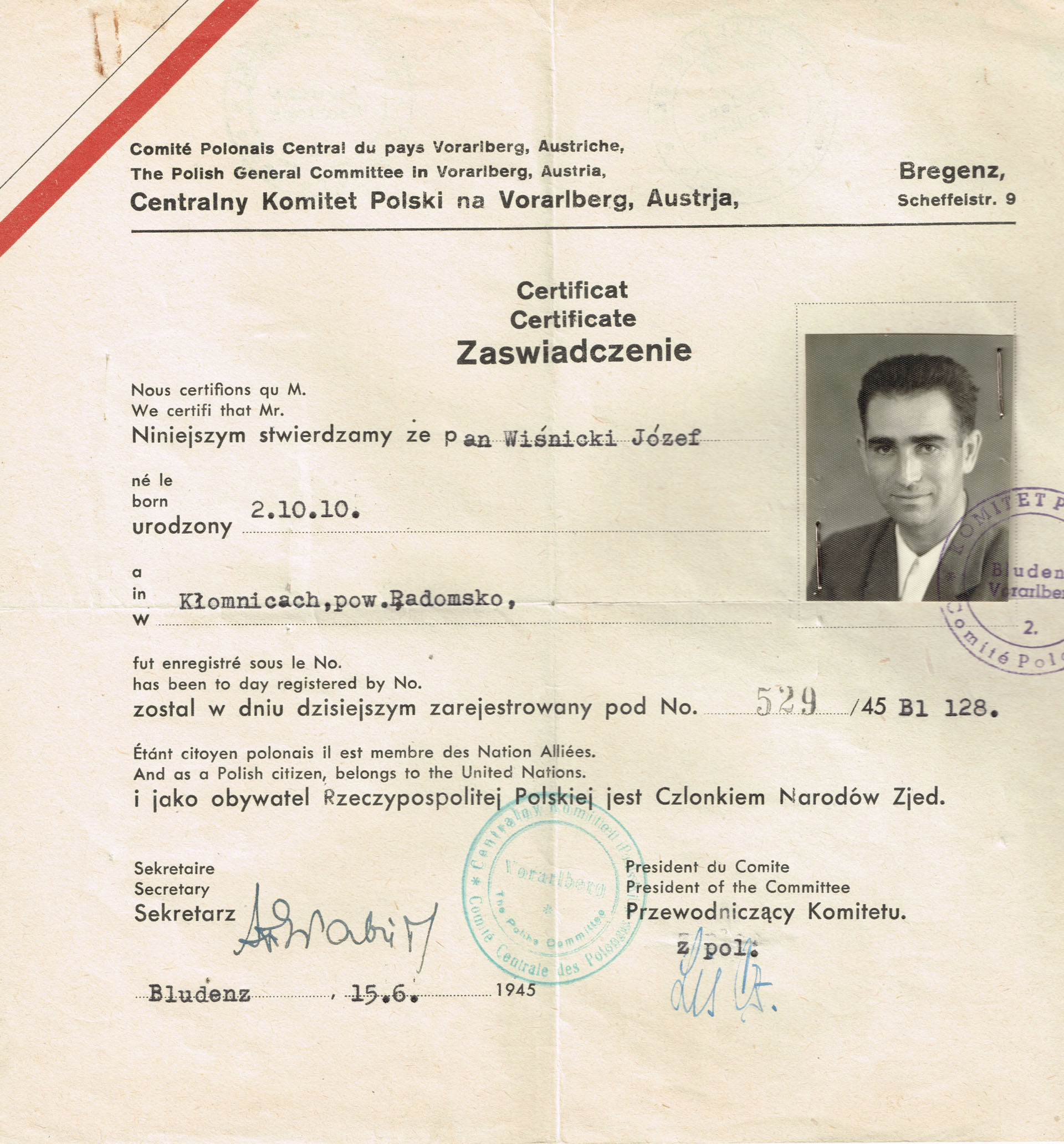
ID card of the Polish Central Committee in Vorarlberg, 1945
Family Archive Wisnicki, West Palm Beach, Florida, USA
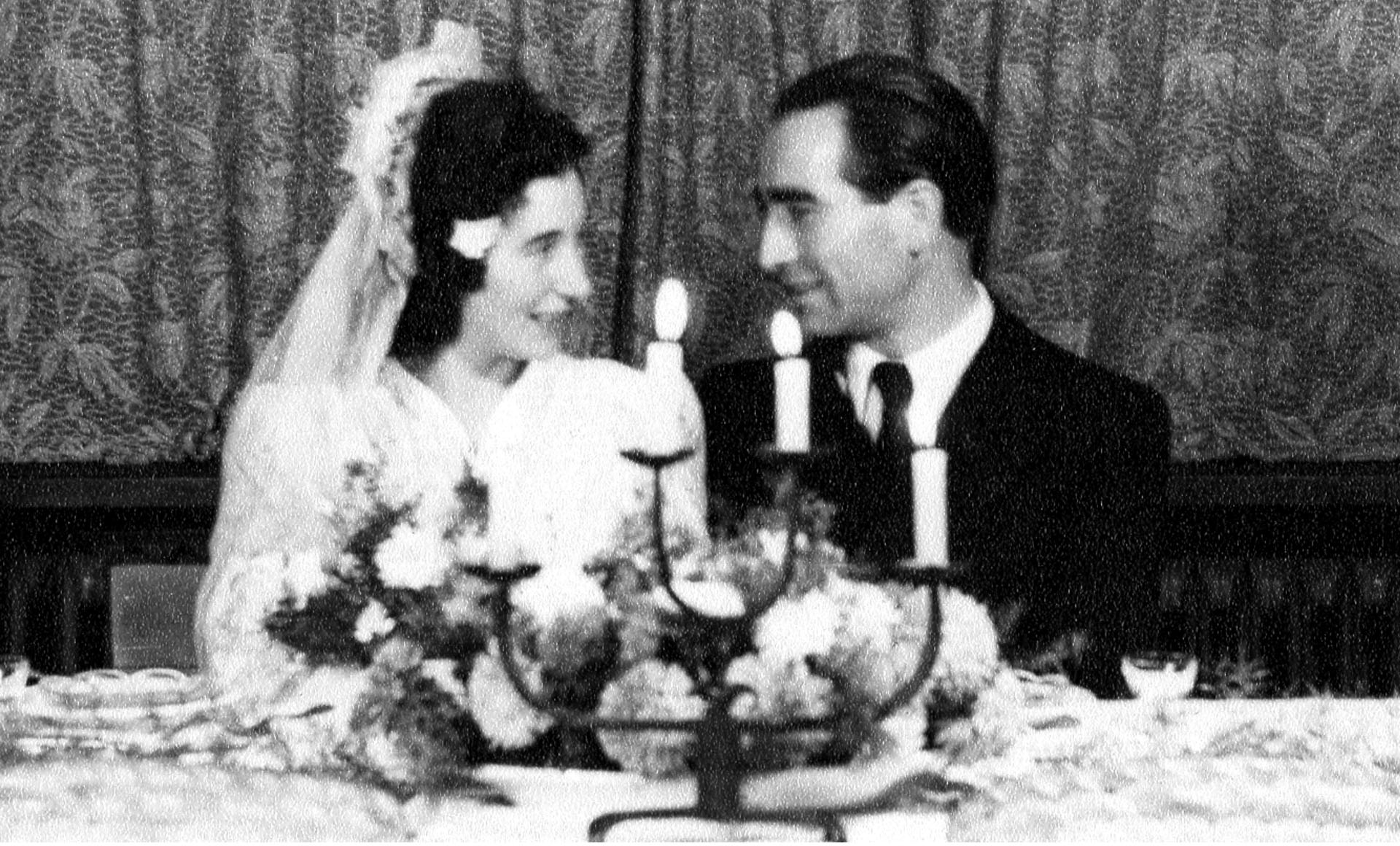
Józef Wiśnicki and Leokadia Justman at their wedding, Innsbruck 1946
Family Archive Wisnicki, West Palm Beach, USA
45 Józef Wiśnicki
Survived as a “Catholic”: Józef Wiśnicki's escapes
Bludenz – Bangs, summer 1944
Under a false identity, Józef Wiśnicki managed to go into hiding as a Polish foreign worker in Vorarlberg. He found work at the Schaub market garden in Bludenz. Wiśnicki is believed to be a Catholic officer in the Polish army. A young colleague, Elmar Schallert, puts Wiśnicki in touch with the former Christian Social politician Karl Zerlaut. He is looking for a man of confidence among the Polish foreign workers.
Wiśnicki has already saved his life three times through a dramatic escape. In 1944, he tries it a fourth time. Later he recalls this time of uncertainty.
“The Hotel, where I lived, had a restaurant. On Sundays, the busiest day of the week, the sister of the hotel owner used to come in and help wait on customers. I used to get from her a so called ‘Shtamgericht’, a dish of potatoes only, for which one did not need any food stamps. The rest of the week she lived with her mother on their farm, located in the Village of Bangs, near Feldkirch and adjacent to the Rhein river in the middle of which ran the border between Germany and Liechtenstein.”
Wiśnicki is not really familiar with the local geography. But he believes the river offers him a chance to get to freedom.
“Here I hoped to have a chance to realize my goal. In a conversation with her, I offered to come to Bangs on my vacation to help them with their work on the farm. (...) I went to Bangs, via Feldkirch, spent there a week helping out on the farm. From the edge of the farm and the river Rhein, I could see the shore of Liechtenstein, a distance of about 1000 feet" he still believes "and at night I could hear their church bells ringing every hour. Just over this river, I thought, people are free, and here I live in constant fear for my life.”
But Wiśnicki is disappointed.
“A border guard on this side, who was a friend of the family I visited with, told me at a dinner conversation, that he didn’t have to worry if he missed an escapee. Anybody who tries and accomplished the crossing of the river, is being sent back by the Liechtenstein border police. Obviously, I didn’t need to hear anything more.... This shattered my dream and I returned to Bludenz.”
Józef Wiśnicki was born and grew up in Częstochowa. He actually experienced September 1, 1939 as a Polish soldier. And like tens of thousands of other Polish Jews, he fled to the east, to Lemberg, where Soviet troops were moving in, just as Hitler and Stalin had agreed with each other. Less than two years later, in June 1941, Nazi Germany also invades the Soviet Union. Wiśnicki returns to Częstochowa, to his parents in the ghetto to which the Germans have meanwhile driven Częstochowa's Jews.
In September 1942, the first selections also take place in Częstochowa. Wiśnicki believes that as a young man he will be sent to work. But the transport is going to the Treblinka extermination camp. On the way, he observes two fellow prisoners squeezing through the skylights of the cattle car - and follows them. The escape succeeds. He finds himself in a suburb of Warsaw - and returns to Częstochowa.[1]
With the help of a non-Jewish helper, he soon plans his third escape. False papers, make him 6 years older and Roman Catholic. He keeps his name. He manages to make it as far as Bludenz. There no one can recognize or betray him.
Nothing came of his escape to Switzerland. But soon afterwards, in August 1944, he was suspected of being Jewish. He tries to escape again, but this time he is arrested with a gun drawn. And once again he manages to get his head out of the noose. He is circumcised for medical reasons, he explains to the police. In the police prison he learns the Lord's Prayer by heart for safety. For three weeks he was held in Gestapo custody in Innsbruck and interrogated. Finally they believed his story and released him back to Bludenz.
But in January 1945 he was arrested again, without knowing why. Until April he works in Bregenz prison as a food delivery boy, then - the war is almost over – he is transferred to the Reichenau concentration camp in Innsbruck.
Wiśnicki survived the last days of Nazi rule there as well. Once again he returns to Bludenz, now actually becoming responsible for the liberated Polish forced and foreign laborers and joining the “Austrian Democratic Resistance Movement”. Still no one knows that he is Jewish.
But in autumn 1945 he learns that Jewish survivors are gathering in Innsbruck and are being looked after there. He met Leokadia Justman in the “Jewish office” in Innsbruck.
On September 15, 1946, the two were married. It is the first Jewish wedding in Innsbruck after the Holocaust.
[1] Josef Wisnicki, My Fight for Survival. New York 1997, p. 15-16. The story of Józef Wiśnicki was researched by Niko Hofinger.

Identity card of Józef Wiśnicki, about 1943
Family Archive Wisnicki, West Palm Beach, Florida, USA

Membership card of Józef Wiśnicki in the Austrian Resistance Movement, 1945
Family Archive Wisnicki, West Palm Beach, Florida, USA

ID card of the Polish Central Committee in Vorarlberg, 1945
Family Archive Wisnicki, West Palm Beach, Florida, USA


